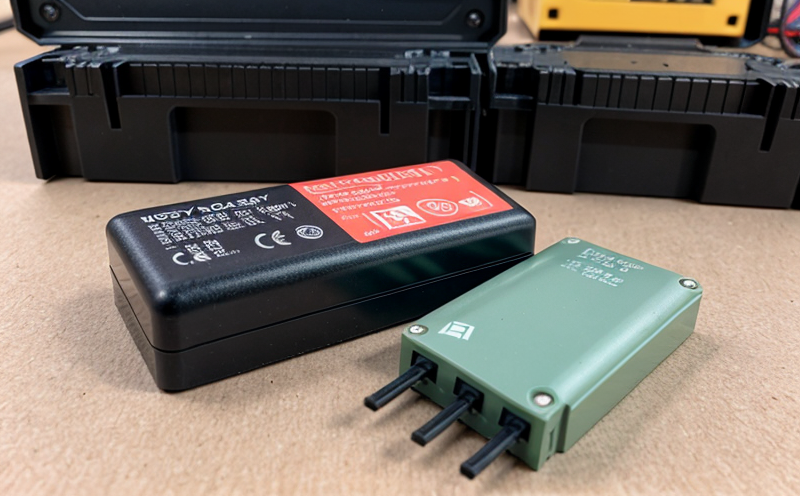ASTM E2395 Lithium Battery Pack Performance Testing Under Environmental Stress
The ASTM E2395 standard specifies procedures to test lithium battery packs under environmental stress conditions, ensuring they meet performance and safety requirements in various operational scenarios. This testing is critical for the automotive, aerospace, and consumer electronics industries where reliability under extreme conditions is paramount.
This service focuses on evaluating the durability of lithium battery packs subjected to a combination of temperature, humidity, vibration, and other environmental stresses as outlined by ASTM E2395. The test aims to identify potential weaknesses in design or manufacturing processes that could lead to premature failure or safety issues during use.
The testing process involves placing fully assembled lithium battery packs into controlled environments designed to replicate real-world conditions. These environments can include temperatures ranging from -40°C to 65°C, relative humidity between 10% and 98%, and exposure to vibration forces up to 2g. The test duration varies depending on the specific requirements of the client but typically lasts for at least 72 hours.
Specimen preparation is a critical step in this process. Lithium battery packs undergo thorough inspection, ensuring that all components are correctly assembled according to manufacturer specifications. Prior to testing, batteries must be fully charged and discharged several times to ensure consistent performance throughout the test cycle.
The instrumentation used for ASTM E2395 testing includes climate chambers capable of precise temperature control, humidity sensors, vibration isolation platforms, and data logging systems to record environmental parameters and battery responses accurately. During the test, continuous monitoring ensures that any deviations from expected behavior are captured immediately for further analysis.
Upon completion of the test, detailed reports summarize results highlighting areas where batteries performed well or exhibited signs of stress-induced degradation. These reports serve as valuable tools for quality managers, compliance officers, R&D engineers, and procurement teams alike who rely on accurate data to make informed decisions regarding product improvements and regulatory compliance.
The ASTM E2395 procedure provides a robust framework for assessing the resilience of lithium battery packs against environmental challenges faced by modern technology products. By adhering strictly to this standard, manufacturers can enhance their reputation for producing reliable and safe electronics while also meeting stringent industry standards.
Why It Matters
The results from ASTM E2395 testing play a crucial role in ensuring the safety and longevity of lithium battery packs. By simulating extreme environmental conditions, this test helps uncover potential flaws early on in the development cycle, allowing manufacturers to address these issues before products reach consumers.
- Enhanced Safety: Identifying weak points through rigorous testing ensures that batteries are less likely to fail unexpectedly or pose risks during use.
- Better Performance: Understanding how packs behave under stress allows for optimization of designs and materials, leading to improved overall performance.
- Compliance Assurance: Meeting regulatory requirements strengthens a company's market position by demonstrating commitment to quality and safety standards.
For businesses operating in competitive markets, these benefits translate into enhanced reputation, increased customer satisfaction, and reduced liability risks associated with defective products.
Industry Applications
The ASTM E2395 procedure finds application across multiple sectors including automotive manufacturing, aerospace engineering, consumer electronics production, and renewable energy storage solutions. In the automotive industry, testing lithium battery packs ensures they can withstand harsh conditions encountered during driving, such as cold winters or hot summers.
In aerospace applications, where reliability is critical due to life-threatening consequences of failure, this test guarantees that batteries will function properly even when subjected to extreme temperatures and vibrations experienced during flight. For consumer electronics manufacturers, meeting these standards helps protect brand reputation by preventing recalls related to battery failures.
Within the renewable energy sector, ensuring that storage systems meet ASTM E2395 requirements enhances confidence in their ability to deliver consistent power output regardless of environmental variations.
Why Choose This Test
- Precise Control: Climate chambers and vibration isolators provide highly controlled environments that accurately mimic real-world conditions, ensuring accurate results.
- Comprehensive Data Collection: Continuous monitoring during testing allows for comprehensive data collection, providing detailed insights into battery behavior under stress.
- Regulatory Compliance: By adhering to ASTM E2395 standards, companies can ensure their products meet necessary regulatory requirements, avoiding costly delays or recalls.
- Early Problem Identification: Identifying issues early in the development cycle saves time and resources compared to addressing problems post-launch.
The combination of precise control over environmental factors combined with comprehensive data collection makes ASTM E2395 testing an essential tool for ensuring the safety, reliability, and compliance of lithium battery packs across various industries. Choosing this test demonstrates a company's commitment to excellence in product development and quality assurance.





